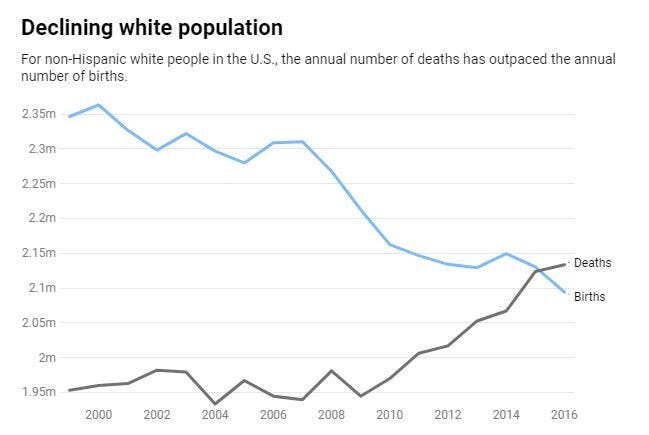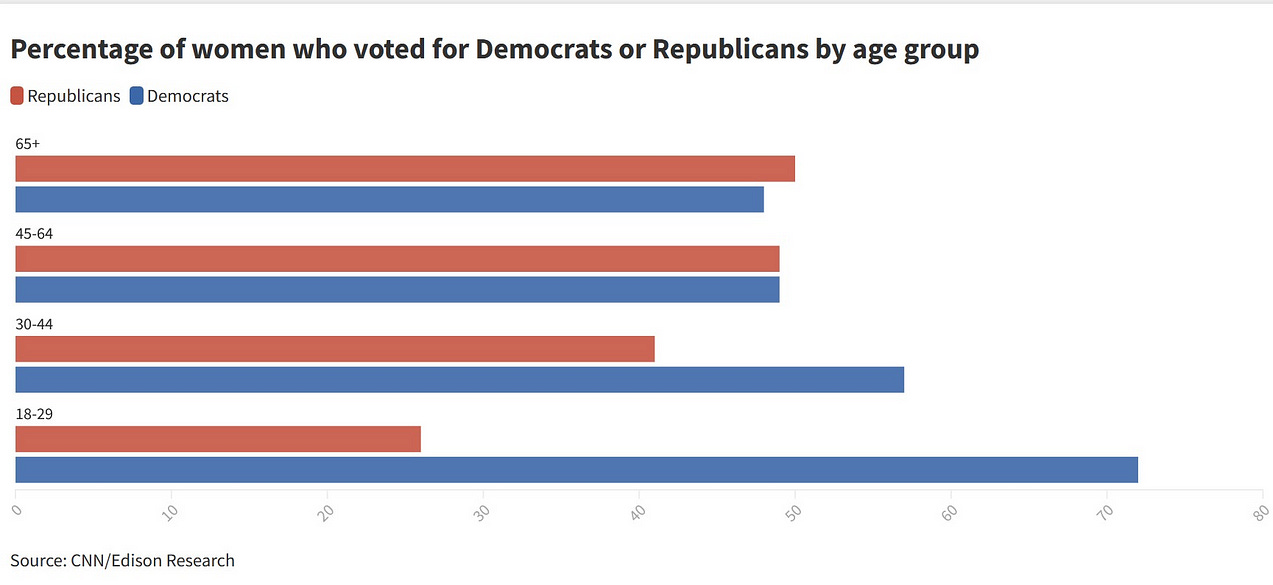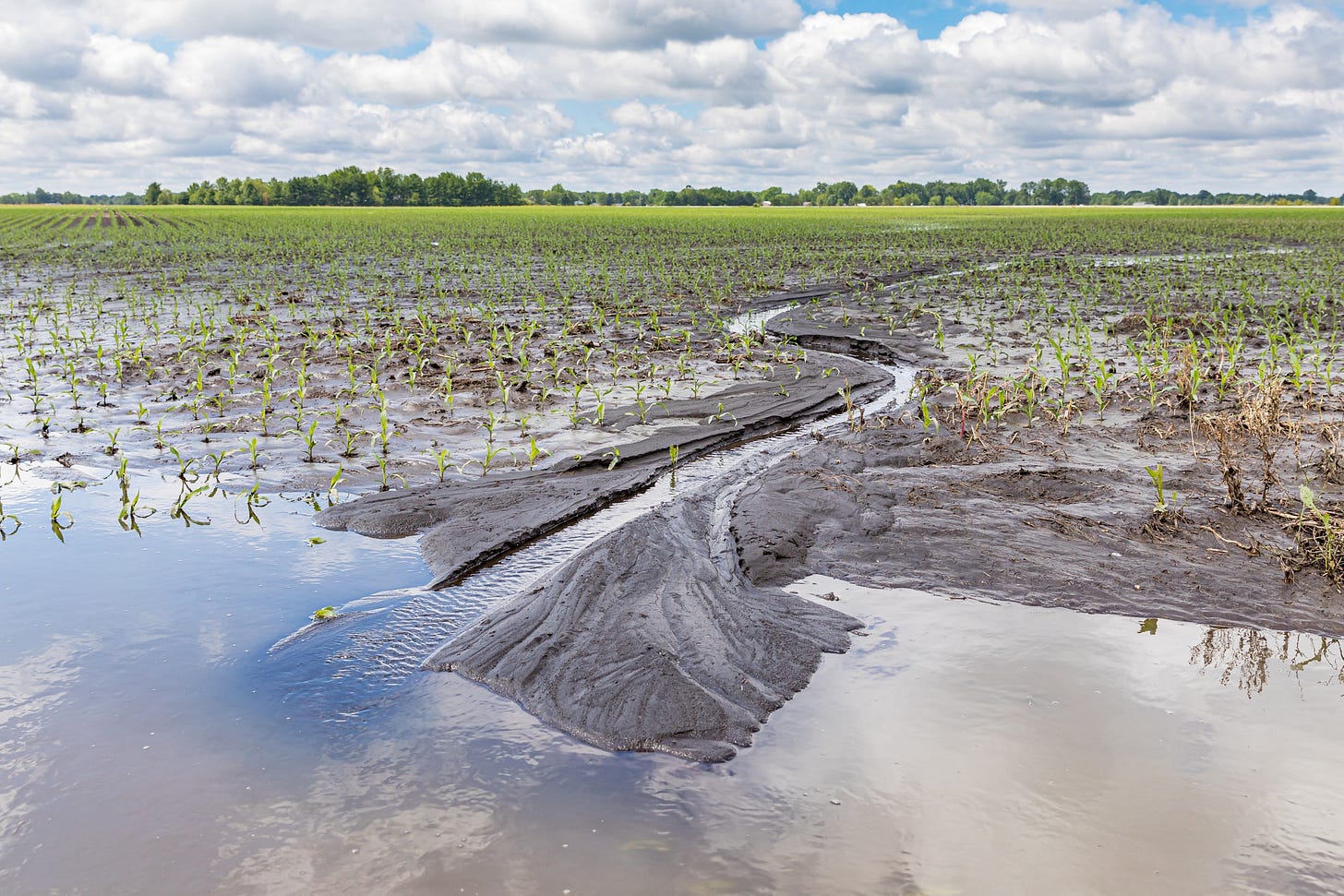Sign, sign, everywhere a sign…can’t you read the sign?
The Five Man Electrical Band (1971)
AMERICAN INTERNAL DIVISION AND WEAKNESS
There’s a 50/50 chance Trump could win in November. Here’s what Nate Silver has to say.
Who Is Favored To Win The 2024 Presidential Election?

Biden wins 50 times out of 100.
In our (528) simulations of the 2024 presidential election.
Trump wins 49 times out of 100.
There is a less than 1-in-100 chance of no Electoral College winner.
Outlier Poll Results Are Inevitable. They’re Also Sometimes Right.
The latest Times/Siena survey shows Trump up by six points among registered voters and three among likely voters.
Tell me with a straight face that we are not in a state of “Cold Civil War”.
This election, like our elections since 2010, is going to be another “stalemate” election. This is how you fight a civil war without outright warfare.
The “good news”, if any is to be found in this miserable state of affairs. Is that this is WHITE, racist America’s “Last Stand”.

There are a lot more women over 65 than there are men, and they tend to vote Trumpublican. As they start dying in big numbers now each year, the Trumpublican “majority” will start melting away.
In 2020, 30.8 million women and 24.8 million men were age 65 and older. That’s 124 women for every 100 men. At age 85 and older, this ratio increased to 176 women for every 100 men.
Overturning Roe was a gut shot to the future of the Trumpublican party. Women under 35 broke 70% for the Democratic party in 2022 in response to the Dobbs decision.
This election is the “Last Stand” for the Trumpublicans.
They know it.
Trump allies test a new strategy for blocking election results
In five battleground states, county-level officials have tried to block the certification of vote tallies - which…
They are counting on a TILTED Supreme Court to give the election to them if they can get close enough. Apropos of that.
Corruption Law Allows Gifts to State and Local Officials, Supreme Court Rules
The court, which has limited the sweep of several anti-corruption laws, distinguished after-the-fact rewards from…
The Supreme Court makes “tips” for “services rendered” by political figures legal. As long as it’s “tastefully” done after they leave office. That way it’s not a “bribe”.
BIG OIL IS RAMPING UP PRODUCTION, WHY?
Big Oil executives push back against calls for fast energy transition
Top oil executives took to the stage of a major energy conference on Monday to vocally oppose calls for a quick move…
Big oil companies including BP and Equinor have written down renewable energy projects and others have been forced to push back their greenhouse gas reduction targets due to greater uncertainties with the transition to clean fuels.
That and unexpected strong demand for oil has stiffened the industry’s opposition to government and activist demands to phase out fossil fuel development. Policymakers also have shifted their focus to energy supply security and affordability since Russia invaded Ukraine and during the latest conflict in the Middle East.
“We should abandon the fantasy of phasing out oil and gas, and instead invest in them adequately” to reflect demand, Amin Nasser, CEO of Saudi Aramco, the world’s largest oil producer, said to applause.
Despite the growth of electric vehicles, solar and wind power, oil demand this year will reach a new record of 104 million barrels per day this year, Nasser said.
BP halts hiring, slows renewables roll-out to win over investors
BP's new CEO Murray Auchincloss has imposed a hiring freeze and paused new offshore wind projects as he places a…
The moves, which have not previously been reported, are part of a decision by CEO Auchincloss to slow down investments in big budget, low-carbon projects, particularly in offshore wind, that are not expected to generate cash for years, said several sources at BP who declined to be named.
They mark a stark reversal from the direction the CEO’s predecessor Bernard Looney took to rapidly move away from fossil fuels. This has weighed on BP’s shares as returns from renewables shrank, while profits from oil and gas soared in the wake of the COVID-19 pandemic and Russia’s invasion of Ukraine.
United States produces more crude oil than any country, ever - U.S. Energy Information…
Energy Information Administration - EIA - Official Energy Statistics from the U.S. Government
The United States produced more crude oil than any nation at any time, according to our International Energy Statistics, for the past six years in a row.

Crude oil production in the United States, including condensate, averaged 12.9 million barrels per day (b/d) in 2023, breaking the previous U.S. and global record of 12.3 million b/d, set in 2019. Average monthly U.S. crude oil production established a monthly record high in December 2023 at more than 13.3 million b/d.
The crude oil production record in the United States in 2023 is unlikely to be broken in any other country in the near term because no other country has reached production capacity of 13.0 million b/d.
Saudi Arabia’s state-owned Saudi Aramco recently scrapped plans to increase production capacity to 13.0 million b/d by 2027.
Together, the United States, Russia, and Saudi Arabia accounted for 40% (32.8 million b/d) of global oil production in 2023.
These three countries have produced more oil than any others since 1971 (counting production in the Russian Federation of the Soviet Union prior to 1991), although the top spot has shifted among them over the past five decades.
By comparison, the next three largest producing countries — Canada, Iraq, and China — combined produced 13.1 million b/d in 2023, only slightly more than what was produced in the United States alone.
Biden isn’t advertising America’s record oil boom
Biden is not “waging war” on American energy. He’s boosting it.
Biden has expedited the construction of an oil pipeline in West Virginia and approved the Willow oil project in Alaska, over the opposition of environmental activists and despite his 2020 campaign promise to stop drilling on federal lands altogether.
Increased oil production has helped keep gas prices low after they spiked in 2022, even as OPEC countries have slashed supply in an attempt to drive prices higher and despite disruptions to the global supply chain wrought by Russia’s war in Ukraine. American production, bolstered by advancements in drilling that improve efficiency, is also helping to meet what is projected to be record global demand in 2024.
Ummm…
Here’s how fucked up the situation is. We DESPERATELY need to be weaning ourselves off of fossil fuels. Yet, we find ourselves using more of them than ever.
While the production of renewables is soaring.
We need to be reducing our energy usage and strategically decarbonizing our global economy by careful deployment of renewable “low carbon” solar panels. Instead, we are actually increasing fossil fuel usage while soaking up all the new capacity from the renewables sector.
Demand for ENERGY is infinite, if we allow it to be.
We need to have a rational allocation and pricing of energy resources. The “Free Market” and the “Dead Hand” are going to kill the planet. Economic “incentives” and “fuel economy standards” aren’t going to cut it.
Unfortunately at least 50% of American’s won’t vote for protecting the future of their children. The economic pain they will suffer now. Combined with their CERTAINTY that government programs to help them will leave them in poverty. Means that they will not vote for any kind of “unwinding” of the oil and gas industry.
Politically, to win elections the Democrats must be FOR “Oil and Gas” at the same time as being FOR “renewables”. This suicide pact is the only position that a majority will support.
That’s how fucked up American politics are right now.
— — — — — —
WWIII — THE OPENING PHASE CONTINUES
China's industrial profits growth slows sharply in May
China's industrial profits rose at a sharply slower pace in May, official data showed on Thursday, underlining the…
China has an industrial “overcapacity” and a weak domestic demand. American analysts tend to see this as Chinese consumers not spending enough instead of the effect of the American trade war that Trump started with his tariffs.
Fun Fact: In the Project 2025 Plan the Trumpublicans hope to implement if he wins in November, Trump wants to abolish income taxes and replace them completely with tariffs.
Trump Eyes Bigger Trade War in Second Term
The former president's past tariffs raised prices for consumers and businesses, economists say. His next plan could tax…
The former president’s past tariffs raised prices for consumers and businesses, economists say. His next plan could tax 10 times as many imports.
A MAJORITY of AMERICANS could vote in favor of this.
Insight: In race to regain rare earth glory, Europe falls short on mineral goals
Four decades ago, a rare earth processing plant on France's Atlantic coast was one of the largest in the world…
Four decades ago, a rare earth processing plant on France’s Atlantic coast was one of the largest in the world, churning out materials used to make colour televisions, arc lights and camera lenses.
In the 1980s and 1990s, output from the plant at La Rochelle set the benchmark for global rare earth prices. It now supplies 4,000 metric tons a year of separated rare earth oxides, a fraction of the 298,000 tons pumped out by China last year.
Europe and the United States now seek to reverse massive migration of rare earth processing to China that took place around 25 years ago.
China became dominant in rare earths, a group of 17 minerals, by producing them at lower prices than the West, helped by government support, and by often ignoring environmental concerns in a sector that can create toxic waste.
Obstacles to boosting EU rare earths output include public opposition to new mines, wary support by European industry which benefits from cheap Chinese imports, limited funding, uncertain demand as EV sales growth falters and weak prices for the metals.
There is a reason that rare earth processing migrated to China and computer chip manufacturing moved to Taiwan. They produce EXTREMELY nasty toxic wastes. Part of “globalism” meant that countries willing to pay that price could get rich doing it.
Globalism is DYING, right now, in front of our eyes.
Right now, we are seeing trade wars and tariffs. A rush to “bring industries home” and “re-shore” critical manufacturing and energy supplies. It’s as if countries are suddenly “battening the hatches” and getting ready for supply change disruptions and possible wars.
MEANWHILE the “sideshow” wars heat up and spread.
Pyongyang Says It Will Send Troops to Ukraine Within a Month
The June 19 defense pact signed between Russia and North Korea included a promise to provide military assistance to one…
While the world’s armies prepare for robotic warfare.
China's Killer Robots Are Coming

The U.S. is falling behind China in the race for fully-autonomous robot soldiers, a defense expert has warned.
Experts alarmed over AI in military as Gaza turns into "testing ground" for US-made war robots
Research identifies numerous risks as defense contractors develop new "killer robots."
Navy Introduces New Robotics Warfare Specialist Rating
US military plans to unleash thousands of autonomous war robots over next two years. The age of autonomous weapons is upon us
US 'Replicator' drone program to cost $500 million per year, Pentagon says
The United States military plans to start using thousands of autonomous weapons systems in the next two years in a bid to counter China’s growing power, US Deputy Secretary of Defense Kathleen Hicks announced in a speech on Monday.
The so-called Replicator initiative aims to work with defence and other tech companies to produce high volumes of affordable systems for all branches of the military.
Military systems capable of various degrees of independent operation have become increasingly common over the past decade or so. But the scale and scope of the US announcement makes clear the future of conflict has changed: the age of warfighting robots is upon us.
THE CLIMATE CRISIS INTENSIFIES
Everything's About to Get a Hell of a Lot More Expensive Due to Climate Change
Intensifying hurricanes, floods, and heat waves are wreaking havoc across the country-and on all of our bank accounts.
The country has already seen 11 “billion-dollar disasters” this year, including the tornadoes that slammed Iowa just weeks ago. Meanwhile, the already strapped Federal Emergency Management Agency faces a budgetary crisis, and sales of catastrophe bonds are at an all-time high.
Now, let’s look back at the inflation readings.
One of the categories remaining stubbornly high while other indicators shrink?
Shelter and housing, natch, as rents and insurance stay hot — and still-elevated interest rates make construction and mortgage costs even more prohibitive. On the energy front, motor fuel may be cheapening, but fuel and electricity for home use are still pricey.
Look at what is happening in the regions that have been hardest hit by climate change.
When it comes to home insurance: Providers are either retreating from or dramatically heightening their prices in states like California, Texas, Florida, and New Jersey, thanks to their unique susceptibility to climate change.
These states have seen supercharged extreme weather events like floods, rain bombs, heat waves, and droughts. National lawmakers fear that the insurance crises there may ultimately wreak havoc on the broader real estate sector.
There’s a lot of housing near the coasts, in the Gulf regions and Northeast specifically; Americans love their beaches and their big houses. Turns out, even with generous (very generous) monetary backstops from the federal government, it’s expensive to build such elaborate manors and keep having to rebuild them when increasingly intense and frequent storms hit — which is why private insurers don’t want to keep having to deal with that anymore, and the costs are handed off to taxpayers.
Housing isn’t going to get cheaper.
In fact, the supply of houses will probably shrink as climate disasters destroy existing stocks and it becomes difficult to get financing to build replacement housing. Because conditions will be so unstable that no one will insure houses and no one will make long term loans on properties that could be destroyed and never rebuilt.
Neither is Food.
Agricultural yields for important commodities produced in those states (fruits, nuts, corn, sugar, veggies, wheat) are withering, thanks to punishing heat and soil-nutrition depletion. The supply chains through which these products usually travel are thrown off course at varying points, by storms that disrupt land and sea transportation. Preparation for these varying externalities requires supply-chain middlemen and product sellers to anticipate consequential cost increases down the line — and implement them sooner than later, in order to cover their margins.
It goes beyond groceries, though. It applies to every basic building block of modern life: labor, immigration, travel, and materials for home building, transportation, power generation, and necessary appliances. Climate effects have been disrupting and raising the prices of timber, copper, and rubber; even chocolate prices were skyrocketing not long ago, thanks to climate change impacts on African cocoa bean crops.
When all the economic indicators that take highest priority in Americans’ heads are in such volatile motion thanks to climate change, it may be time to reconsider how traditional economics work and how we perceive their effects. It’s no longer a time when extreme weather was rarer and more predictable; its force and reasoning aren’t beyond our capacity to aptly monitor, but they’re certainly more difficult to track. You can’t stretch out the easiest economic model to fix that. And you can’t keep ignoring the clear links between our current weather hellscape, climate change, and our everyday goods.
we’re no longer in a world where climate change affects the economy, or where voters prioritizing economic or inflationary concerns are responding to something distinct from climate change — we’re in a world where climate change is the economy.
Extreme Wildfires Have Doubled in 2 Decades, Study Finds
In a changing climate, extreme wildfire events are becoming far more common and more intense, according to a new…
Canada's 2023 wildfires created four times more emissions than planes did last year - report
Months-long fires spewed about the same amount of carbon dioxide that 647m cars put in the air in a year, data shows
“The fire spewed nearly four times the carbon emissions as airplanes do in a year, study authors said.”
That’s in 2023.
In 2021 there were HUGE fires in Siberia.
Record-high carbon dioxide emissions from boreal fires — March 2023
There were record-high carbon dioxide emissions from boreal forest fires in Northern Canada and Siberia in 2021 continuing a trend that has been going on since at least 2000, according to new international research presented at the annual meeting of the American Association for the Advancement of Science (AAAS) in Washington DC. While boreal fires usually account for 10% of global fires’ carbon dioxide emissions, they contributed 23% in 2021, the study authors reported.
The researchers warn that boreal ecosystems are poised to become perhaps the dominant source of intensive fires and carbon emissions from fires in the future.
Another way of putting these emissions from 2021 into context is that it is roughly double the emissions in that year from aviation.
So the fires in 2023 were roughly double the size of those in 2021.
A New Danger at America's National Parks
Extreme heat is making it harder for rescue helicopters to take off.
This isn’t just helicopters. Jets cannot take off from airports when temperatures get over +100°F. Cities like Houston and Phoenix are airline hubs. How are they going to function when temperatures are over +100°F for 6 months of the year?
Countries are failing.
Kenyan President Rejects Bill That Led to Deadly Protests
A day after at least 23 people were killed in demonstrations against a tax increase, President William Ruto withdrew…
The tax increase was to avoid defaulting on Kenya’s debt to international banks. You might remember that the Kenyan president was recently in Washington at a state dinner with the Biden’s.
Countries across the planet are being crushed by debt to First World banks and International Agencies. As conditions in these countries worsens instability will increase.
Riskier strategies for “mitigation” are being considered.

First synthetic gene drive for plants could help eradicate weeds
Quick spread of “selfish” genetic sequences may one day knock back crop-destroying plants that have evolved to resist many herbicides.
Because, “what could go wrong” with attempting to force gene sequences through weeds in order to make them weaker.
— — — — — — — —
Collapse is ACCELERATING, our response to it is not.
In fact, we seem to be “dis-unifying” and becoming less able to mount any kind of global response to the Climate Crisis.
Instead of mounting a “global war” effort to “come together” and tackle that problem. We are pursuing fantasies of creating “fortress” nations with “iron borders” that we can retreat into and ride out the coming turmoil.
We are losing our trust in one another and preparing for global war.
This is my analysis.
This is what I see.
This is my “Crisis Report”.
rc 062824
NOTES:
I am using this site more and more frequently and highly recommend them for the scope of their vision and willingness to include “non-mainstream” sources like Medium and SubStack writers.
The Collapse Chronicles
Everything's About to Get a Hell of a Lot More Expensive Due to Climate Change
Documenting the ongoing climate crisis, mass extinctions, and the decline and fall of post-industrial capitalism. Some…
Interesting things I saw this week included.
Fossil of child with Down syndrome hints at Neanderthal compassion
Living among a small band of Neanderthals in what is now eastern Spain was a child, perhaps 6 years old, with Down…
Bones reveal first evidence of Down syndrome in Neanderthals
Individual’s survival into early childhood suggests a high level of community care.
I did not know that the other hominids were susceptible to Down’s Syndrome. Apparently it occurs even among primates.
I found it incredibly moving to imagine a Neanderthal community caring for and cherishing this disabled child.
In his home near Ukraine's front line with Russia, Yurii makes a stand
In the devastated village of Dolyna, Yurii maintains a lonely vigil. There were 500 residents living here - until the…

This story typifies how collapse will play out in many places. A pulse of violence will wash through, services like electricity and water will be disrupted, and the population will flee to other places.
Leaving remnant dregs of people managing hardscrabble lives in ruins that may never be rebuilt.










All this endless going on about American politics is latent American exceptionalism. It's way past mattering. America is unimportant.
And please stop cooperating with the DARPA spin Dr's and stop insulting real, awesome dogs, by calling DARPA's killer robot a dog. Dogs have complex emotions and can form deep bonds with humans and other animals. Like the hand gun, the robot is designed to kill humans.
Kenya's debt seems mostly owed to China who are following the economic hitman approach where you load a country up on debt they can't repay and when they default you take what you want.
https://adf-magazine.com/2024/02/as-chinese-debt-comes-due-african-nations-struggle-with-repayments/